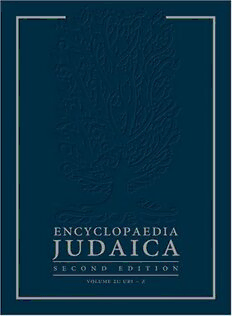
Encyclopaedia Judaica (Coh-Doz) PDF
784 Pages·2007·18.448 MB·English
Most books are stored in the elastic cloud where traffic is expensive. For this reason, we have a limit on daily download.
Preview Encyclopaedia Judaica (Coh-Doz)
Description:
The new edition of Encyclopaedia Judaica brings a monumental reference work into the twenty-first century. In 1928 Nahum Goldman, head of Eshkol Publishing, in Berlin, began work on a comprehensive reference work about the history and culture of the Jewish people. That work was never completed, and the 10 finished volumes remain as both a witness to European Jewish scholarship and a reminder of Hitler's destruction of that tradition. Goldman survived the Holocaust, and in 1966, he used his reparation money to revive work on the encyclopedia at Keter Publishing House, in Jerusalem. In 1972, more than 45 years after the work began, the first edition was completed. Keter Publishing House and Macmillan Reference USA, its American partner, released Hebrew and English-language versions of the work. Like the original work, it was a thorough, organized overview of Jewish life and knowledge. Updating a large resource is difficult. The publishers issued yearbooks and two supplements cumulating the 1973–1982 and 1983–1992 volumes as well as an updated CD-ROM version in 1997, but the Jewish world has changed a great deal since then. The second edition is also a collaboration of Keter Publishing House and Macmillan Reference, which is now a Thomson Gale imprint. Editors Berenbaum and Skolnik gathered an international team of more than 50 divisional editors and 1,200 scholars to produce the work. They have created 22 volumes with approximately 22,000 entries. Some 2,600 entries are new, and 12,000 have been substantially revised. As they did in Encyclopedia of Religion (2004), the publishers left the original articles intact and added updated material in an appended article that follows. This edition has 150 pages of color inserts appearing as centerfolds in each volume as well as 600 maps, tables, and illustrations. There are also 30,000 new biographical entries. Why is this edition different? Building on the scholarship of the first edition, the editors have added material that documents today's Jewish communities. Since the publication of the first edition, Israel has been through two wars and two intifadas, the role of women in Jewish life has greatly expanded, and the Soviet Union has disappeared. The most rapidly growing Jewish communities in the U.S. are in Las Vegas and Phoenix, but the actual number of Jews in the country is declining due to low birth rates. A whole new generation of scholarship has emerged, with new information about everything from the Bible and the Talmud to women's studies and the Holocaust. The contributors to this edition used the material of the great scholars such as Salo Baron, Cecil Roth, and Gershom Scholem as a foundation for their new insights, giving users greater depth and a modern perspective. Volume 1 has a list of the editors and contributors. They include Yehuda Bauer (Hebrew University), David Ellenson (Hebrew Union College), Deborah E. Lipstadt (University of California, Los Angeles), and Xun Zhou (University of London). The encyclopedia features entries such as an article on Jewish law (Mishpat Ivri) written by Justice Menachem Elon, deputy president of the Supreme Court of Israel. He examines ancient religious law as reflected in the courts of a modern, sovereign Jewish state. Entries about the Bible include both the great medieval commentators such as Rashi and Maimonides and modern critical literary studies of the Bible as an integrated work. Contributors examine the sources of the Bible, its composition, and its authors. The Talmud receives similar treatment, with more than 100 biographies of the greater and lesser rabbinic figures and more accessible material, reflecting the increased participation of the public in Talmudic study. The women's perspective appears throughout the encyclopedia, with articles about biblical stereotypes, their views about the mikveh (ritual bath), and biographies of women both ancient and modern (Beruryah, a second-century Talmud scholar; Bella Abzug). Agunah (Orthodox women who cannot remarry because their husbands refuse to grant them religious divorces) and coverage of the bat mitzvah and the Women of the Wall case are other examples of the increased emphasis on women's issues in this edition. Extensive articles document the contributions of Jews to the arts, sciences, sports, politics, and entertainment. Albert Einstein, Rita Levi-Montalcini, Amos Oz, and Philip Roth appear along with Victor Borge, Jascha Heifetz, and Sandy Koufax. Each of the 50 states and the countries of the world, as well as major cities, have entries, as do museums, cultural institutions, and organizations. The Holocaust and Israel occupy the major part of volumes 9 and 10, respectively, reflecting their important roles in Jewish history and culture. Several thematic outlines (for articles on history, religion, language and literature, Jews in world culture, and women) and a detailed index help users pinpoint specific information. The e-book version uses the standard Gale interface and is available as part of the Gale Virtual Reference Center. One nice feature for users who print or download is the option of getting the text in PDF format if desired. The second edition of Encyclopaedia Judaica is a welcome addition to reference collections. By documenting the modern Jewish experience while retaining links with its rich past, it provides users with information about all aspects of Jewish religion and culture. This work received the 2006 Dartmouth Medal, a well-deserved award.
See more
The list of books you might like
Most books are stored in the elastic cloud where traffic is expensive. For this reason, we have a limit on daily download.
